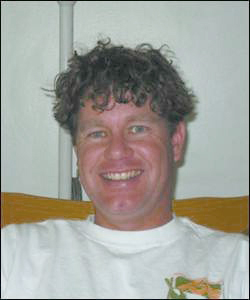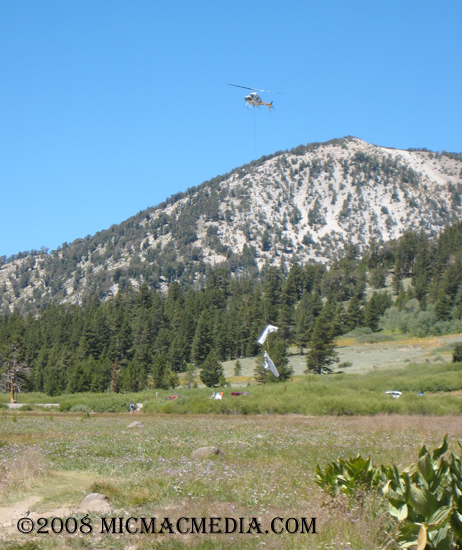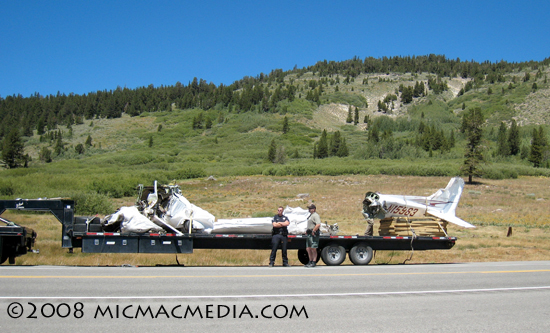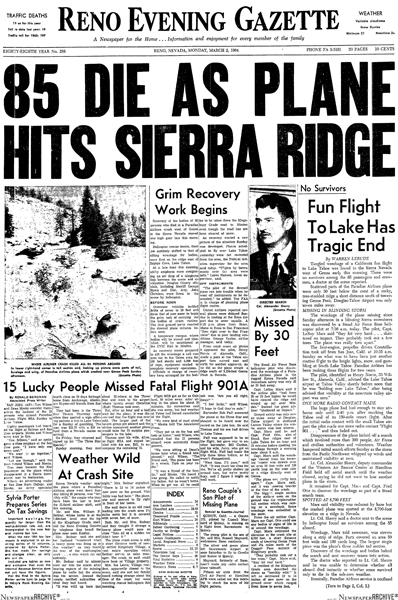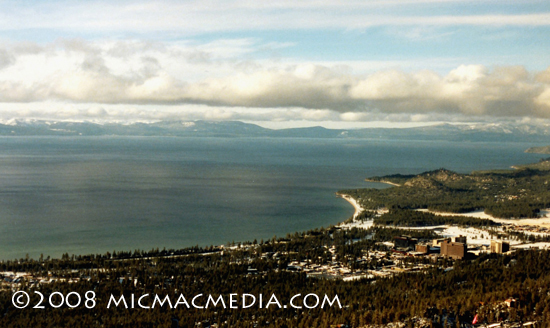 |
|
|
Follow Mark on Facebook for more stories |
||
 |
|||||
|
Tahoe Nugget #145 Tahoe Plane Crash On July 2, 2008, Tahoe lost one of its best when Clayton Beck was killed in an airplane crash about 25 miles northwest of his home in Truckee. The 37-year-old Beck was a highly-acclaimed freestyle ski coach who founded and ran the Alpine Meadows freestyle program for eleven years. He grew up in Carnelian Bay (where I live) and graduated from the University of Nevada Reno (where I went to school). Among the many top athletes Beck coached was 2002 Olympic mogul silver medallist Shannon Bahrke and gold medal Olympian Johnny Mosely. In 2002, Clay's freestyle team won the United States Ski and Snowboard Association's most prestigious award – Freestyle Ski Team of the Year. Clay Beck was a true adventurer, an avid hang-glider, pilot, hiker, mountain biker, and skier. Two years ago, Clay made local headlines when he rescued a drowning triathlete from Donner Lake. It was the seventh person he had saved from drowning during his lifetime, a feat which had earned him the nickname, "Guardian Angel." The Federal Aviation Agency (FAA) is investigating the crash, but Clay's father Craig, also an experienced pilot and the producer of the 1975 ski film classic "Daydreamers," suspects that the experimental aircraft had a fuel problem and the engine quit. An eyewitness on the ground reported that she heard the engine sputtering. Without power, the plane failed to clear the last ridge by about 30 to 40 feet before Clay could make an emergency landing at the nearby Sierraville Dearwater Airport. Tragically, Clay is the third family member to die in a plane crash. His grandfather, Don Beck, who won several national championships during a prolific racing career, died when his plane crashed into Lake Tahoe in 1991. And Steven Johnson, the father of Clay's wife, Lisa, also died in a plane crash. During his career, Don Beck had broken many aviation records and later donated his tricked-out biplane "Sorceress" to the Smithsonian Institution's National Air and Space Museum. Flying over the mountains near Lake Tahoe is a tricky and sometimes deadly business. On August 8 of this year, a man flying a single engine aircraft from the Bay Area was killed when he crashed into the side of Mt. Baldy, about two miles northwest of Incline Village. I happened to be hiking the Mt. Rose Meadows while a helicopter crew was retrieving the aircraft debris from the remote crash site. See photos B & C. Tahoe's worst aviation disaster on record occurred on March 1, 1964, when a plane carrying 85 people from the Bay Area to the Tahoe Valley Airport (South Lake Tahoe) crashed in poor weather conditions killing everyone on board. Flying into a Tahoe snowstorm is already risky, but this tragedy was only partially caused by weather. In reality, the crash was blamed on a variety of issues, including pilot error, sloppy ground maintenance, faulty equipment, and the falsification of a weather report by an airline official. In retrospect, it appears that the passengers and crew on board this Paradise Airlines flight were doomed from the start. Not only was the altimeter malfunctioning (problems with it had been reported 11 times in the previous 8 months and it had not been properly serviced and repaired), as the pilot was preparing to depart San Jose the airline's Tahoe station manager falsified the weather report. Unwilling to turn away a lucrative plane full of passengers, the manager lied and told the pilot that sky conditions at the lake were thin, broken clouds, instead of the real conditions which consisted of heavy clouds, snow showers and icing conditions. The captain flying the four-engine Constellation flew into weather conditions he had not been led to expect with a plane that was not equipped with de-icing devices. In addition to the faulty altimeter, the aircraft's compass had been improperly adjusted by a mechanic and may have been off by as much as 15 degrees. A subsequent investigation by the Civil Aeronautics Board (CAB) surmised that the pilot was caught off guard by blizzard conditions as he made his descent towards the Tahoe airport so he abandoned his authorized approach and headed eastward at 9,000 feet toward what he hoped would be clear sky. Instead the aircraft crashed into the side of Genoa Peak. Investigators concluded that if the plane had been flying only 300 feet higher or 300 yards to the right, the disaster may have been averted. It is still the worst accident ever involving a Lockheed L-049 and is currently the 23rd worst aircraft accident in U.S. history. Despite the screw ups by the mechanics and the outright lies by the airline's airport manager, much of the blame was charged to the pilot. In its report, CAB stated that the pilot "should not have attempted a visual landing approach during adverse weather conditions" and that he was "flying below the minimum altitude prescribed for operations in mountainous areas." Three days after the wreck, Paradise Airline's operating license was suspended. Later, when the outfit's license expired, the FAA refused to renew it. Tahoe Nuggets are now archived at www.thestormking.com Photo #1: Clayton Stephen Beck (1971-2008): A man who made a difference.
|
|||||
|

